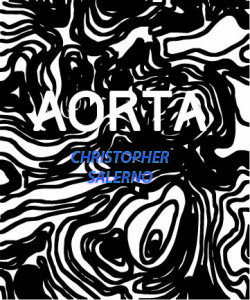Aorta
Christopher Salerno
Praise for Aorta
With a casual precision, or more like a precise casualness, Salerno is able to, at once, run experiments and confirm laws. “I wake up remembering that words are tries,” he says in “The Evening Report,” but I’m not so sure. In Chris Salerno’s hands, pretty much every word feels like a foregone success.
Chris Tonelli
Emerson makes contradictory claims for the necessity of a poem: it must be ensouled, and it must be vascular. Spirit and blood: these are poetry’s markers, these are its matter and antimatter. Christopher Salerno is at work in confounding such oppositions: “Convergence, not distance Is the more startling medium.” As for soul, Leibniz has an old but beautiful idea. He sees how the world pours into the self through every sense, a kaleidoscope of asymmetrical facts and sensations that whelm not with beauty but with incoherence; but, as perception becomes apperception, as sight begins to see, as the ears hear their own hearing, the inchoate begins to assemble into some other wonder, not exactly bewilderment, but understanding—that coherency of unlike experiences Leibniz calls soul. In this quite lovely sense, Salerno’s poems—each of them individually, and then all taken as a whole—offer us who read them some glimpse of what it is to watch a soul form. It forms, as Salerno’s lines—varying from the axiomatic to the ambiguously narrative, from the Heraclitean fragment to the merest shard of daily perception—astonishingly show, along the lines of the blood, the nerves, the muscles, that cannot be escaped as the mind’s most fundamental thinking. Frost gave us the guide “who only has at heart your getting lost.” Salerno gives us someone more needed: the heart of one who is lost. But not desperate. “I’m not lonely I’m happy,” says Salerno, by which I take to mean that happiness here is tied to all that happens, all that hap, all that happenstance—the very fact-stuff and nerve-stuff of life. How can one be lonely who is so full as to be overbrimming? Salerno’s poems reveal we are each one who is such: not lonely, happy. And understanding that happiness is the beginning of something poetry has long promised us: a soul and a heart, both.
Dan Beachy-Quick
Christopher Salerno was born and raised in New Jersey and North Carolina. He has degrees from East Carolina University and Bennington College. His books of poems include ATM (Georgetown Review Book Prize, 2014), Minimum Heroic (Mississippi Review Book Prize, 2010), and Whirligig (Spuyten Duyvil, 2006). His other chapbooks are Automatic Teller (Laurel Review Midwest Chapbook Prize, 2013) and Waving Something White (University Book Exchange, 2003). He’s an Assistant Professor of English at William Paterson University where he manages the new journal, Map Literary.
47 pp. perfect bound, 5" x 6"
